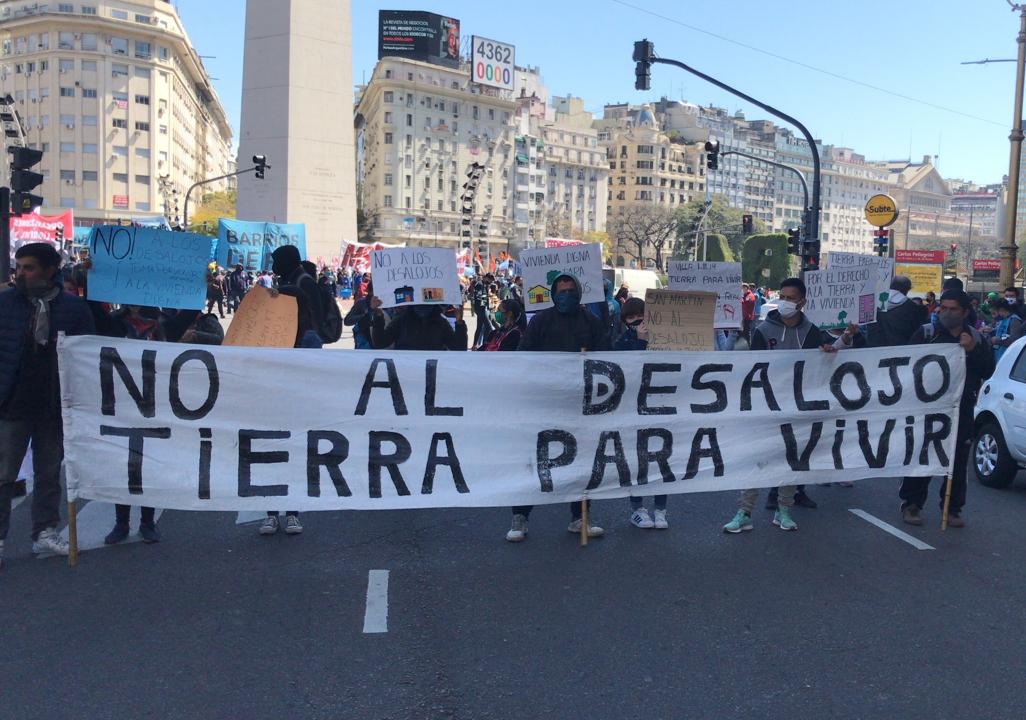RIO DE JANEIRO, BRAZIL – Thousands of people demonstrated in the center of the Argentine capital against the violent eviction of people from land in the village of Guernica. In addition to those directly affected, countless social organizations, leftist groups and representatives of the Union of Marginalized Workers (UTEP) joined the protests.
In July this year, up to 2,500 families settled on the approximately 100-hectare site in the province of Buenos Aires and have been occupying it ever since.
Commenting on the grounds for the land occupation in the middle of the lockdown caused by the coronavirus pandemic, they had said: “Our situation is becoming increasingly hopeless. There is no more money to pay the rent. There is no more room for further accommodation on our families’ land. Our salaries have been cut, many have been laid off, and casual work is declining. The laws prohibiting layoffs and evictions are not being complied with. Many of us are already living on the streets, particularly women who are fleeing from domestic violence with their children.”

In late October, 4,000 police officers evacuated the area by force, where around 1,400 families had remained.
In a press conference, the people concerned reported police attacks, headed by the controversial provincial Minister of Security, Sergio Berni. The precariously erected shanties of land-grabbers were systematically burned down and the inhabitants attacked with tear gas and rubber bullets.
While the majority of inhabitants retreated when faced with police action, others fought back with rocks and sticks. According to police reports, 37 people were detained.
The eviction of the area complied with a decision by the competent judge, Martín Rizzo. He had earlier upheld the complaint of several parties claiming ownership of the land that had been abandoned for a long time, despite the absence of any official ownership documents. After twice deferring the eviction deadline, the court set it for October 30th.
Several weeks of negotiations had preceded this date in an effort to find consensual solutions between the Peronist provincial government and representatives of the families settled on the occupied land.
The Minister for Community Development, Andrés Larroque, referred to the efforts that had led to the voluntary evacuation of some 700 families in mid-October. The government had pledged to provide 3,000 parcels of land within six months, along with connections to infrastructure.
Furthermore, there would be a variety of temporary financial measures to assist those affected to pay rents or, if possible, to build housing on their own land. According to Larroque, this is part of the government’s comprehensive housing plan, which will provide 85,000 parcels of land and build 33,000 housing units across the province.
However, human rights organizations point to the government’s intention to criminalize the occupation of land from the outset.
Diego Morales, an attorney for the Center for Legal and Social Studies, recalled that the first state-ordered establishment of a register of residents in September was immediately used by the judiciary to indict 500 of those registered for land grabbing.
The goal is now to have the proceedings against these people overturned and, at the same time, to reopen the dialogue with the government, which was suspended by the police eviction, in order to find solutions for the displaced population.
“One can see the two faces of the state here,” said Morales. “On the one hand, the effort to reach a compromise regarding resettlement, on the other hand, the decisions made by the prosecutor’s office and the judge to enforce the eviction.”
However, some families complain that the promised state aid has not reached them in the end. “Over the years one learns many things. Enough of lies,” a person involved told the daily Página 12: “They need us, the poor, to vote for them, but after that, they no longer remember us.”

